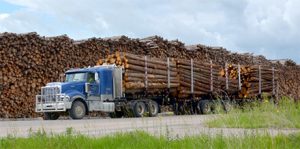As described in today’s DTN analysis, the US and Canada have differing views on whether timber and forestry are essential industries. The impact is being felt differently in the US where it is classed as an essential however, the turmoil is being felt on both sides of that border. Source: Timberbiz
Norsask (Canada)
NorSask’s primary lumber market is the United States and the COVID-19 virus is causing so much economic turmoil that buyers in the United States that normally buy NorSask lumber are now ‘sitting on the sidelines’ not purchasing our lumber. The US lumber market has ‘dried up’ by as much as 50%.
As soon as April 2020, NorSask cannot continue producing large amounts of lumber that it cannot sell into the United States housing market and so the company will be transitioning, on a temporary basis, to single-shift production by early April 2020.
NorSask is guessing that the market impact of COVID-19 will be 5 months (April to August 2020).
West Fraser (Canada)
In response to the continuing COVID-19 pandemic West Fraser is taking additional steps to respond to changing operating and market conditions.
Effective March 30, lumber production at all British Columbia, Canada, sawmills will be curtailed for one week. This will result in the elimination of an additional 24 million board feet of production for the week in addition to the curtailments and reduced production announced on March 19.
Effective March 30, plywood production at the company’s Alberta Plywood and Slave Lake Veneer facilities will be temporarily suspended until at least 6 April. This will reduce the company’s plywood production by an additional 6500 msf per week.
Stella Jones (USA)
Stella-Jones provided an update on its North American operations in the face of the Covid-19 pandemic and orders issued by Canadian provincial and US state authorities.
The company confirmed that while certain government authorities have ordered the closure or minimization of all non-essential business operations in regions where it operates, the corporation falls within the exemptions for essential workplaces, businesses that provide priority services and activities and workforces that carry out critical manufacturing. It therefore plans to continue operations at all of its North America treating facilities and supporting distribution networks while being mindful of potential impacts in light of the current context.
“Stella-Jones carries out essential services as a manufacturer of pressure treated wood railway ties necessary for the operation and maintenance of transportation systems and critical infrastructure. As a producer of utility poles, our products remain crucial for the delivery of electrical distribution and transmission by utilities. Our position as a leading lumber supplier requires us to provide products essential to construction services in the residential sector and to ensure continuity of supply of forestry products critical to multiple facets of the economy.” Stella Jones’ spokesperson Eric Vachon said.
“Stella-Jones will maintain full adherence to measures put in place by applicable government authorities while fulfilling its responsibility to continue operations to allow critical businesses to operate resiliently during the Covid-19 Pandemic response.”
Norbord (USA)
Norbord announced that effective 30 March, it will commence reducing production across its portfolio of North American oriented strand board (OSB) mills in response to the demand impact of the COVID-19 pandemic.
The company will adjust its operating configuration by reducing shifts and running a number of its North American mills on alternating schedules to match production with an anticipated reduction in OSB demand and to comply with government-imposed restrictions. This approach will allow the company to continue to serve its customers, retain operating flexibility and preserve jobs for as many employees as is practicable, while at the same time being prepared to quickly resume normal operations when economic conditions improve.
This adjusted operating configuration will initially result in a 25% reduction to Norbord’s currently operating North American mill capacity.
The OSB demand situation is changing day-by-day, and the company’s ability to continue to operate any of its mills could be influenced by factors outside Norbord’s control, including government-imposed restrictions, therefore additional operating adjustments may be necessary. The company does not intend to provide further operational updates unless there is a significant change in this curtailment strategy.
Norbord’s European business is prepared to take similar action and will adjust mill operating schedules as needed to match production with demand.
In addition, the company is deferring non-critical capital projects and further reducing its 2020 capital expenditures budget by 25%, from US$100 million to US$75 million, to preserve cash and balance sheet flexibility.








